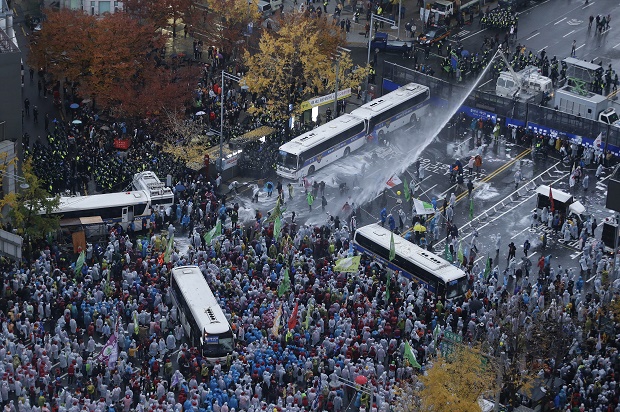
South Korean riot police officers spray a water cannon as police officers try to break up protesters who try to march to the Presidential House after a rally against government policy in Seoul, South Korea, Saturday, Nov. 14, 2015. Police fired tear gas and water cannons Saturday as they clashed with anti-government demonstrators who marched through Seoul in what was believed to be the largest protest in South Korea’s capital in more than seven years. AP File Photo
SEOUL, South Korea—South Korean police are bracing for a fresh anti-government protest in Seoul on Saturday, with critics accusing President Park Geun-Hye of increasingly resembling her authoritarian late father’s heavy-handed rule.
READ: S. Korea vows zero tolerance ahead of fresh anti-gov’t rally
Some 18,000 police backed by water cannon will be deployed to keep order when an expected 50,000 protesters take part in the rally outside the City Hall.
Police had initially banned the rally but organizers appealed to the Seoul Administrative Court, which overturned the order, paving the way for a second massive protest in the capital in the space of a month.
READ: Almost 40 S. Korean police hurt in anti-FTA protest
The first rally on November 14 drew around 60,000 people and saw numerous clashes between protestors and police using water cannon.
A 69-year-old farmer fell into a coma after being knocked to the ground by a water cannon during a clash outside the Jongro District Office.
READ: Tens of thousands march in South Korea antigov’t protest
Saturday’s rally is likely to entail an hour-long march from the City Hall to Seoul National University Hospital where the farmer, Baek Nam-Ki, has been hospitalized.
Organizers vowed to mount a peaceful demonstration this time and some 300 religious figures including Buddhists, catholics and protestants, who will each carry a flower in their hand, plan to set up a human wall to separate protesters from police.
While presiding over a government cabinet meeting on November 24, Park described the earlier demonstration as an attempt “to negate the rule of law and incapacitate the government,” calling for a crackdown on those who incite “illegal, violent protests.”
She also called for a ban on the wearing of masks by protesters, saying it was the sort of practice adopted by the Islamic State group, sparking angry reactions from opponents.
Her prime minister, justice minister as well as prosecutor general all scrambled to issue warnings against violent anti-government protests.
Prosecutor General Kim Soo-Nam said on Tuesday that law enforcement agencies would use all efforts to “uproot forces seeking to topple” the government.
Park’s administration is facing mounting resentment over a range of issues including her plan to impose new history textbooks on schools, to further open the agricultural market and reform the labour market, making the dismissal of workers easier and cutting wages for older workers.
Critics say Park, despite an election promise to reach out to opponents for national unity, is increasingly reliant on strong-arm tactics used by her late father Park Chung-Hee, a general turned authoritarian leader who ruled the country for 18 years until he was assassinated in 1979.
Saturday’s rally is to be jointly organized by groups including the militant Korean Confederation of Trade Unions, the federation of farmers’ associations known as Jeonnong, the national teachers union and the association of urban poor.